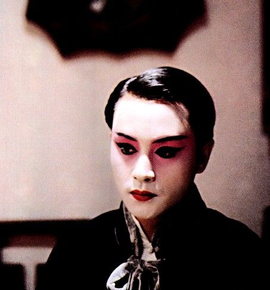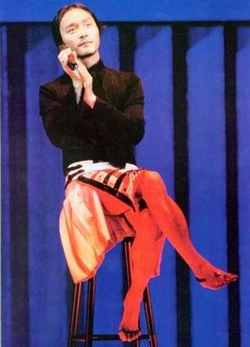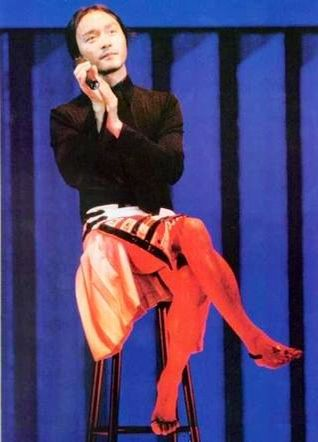|
"I am what I am, firelight of a different color." I grew up listening to this song and these lyrics. Emboldening and encouraging the concept of individuality, it is a source of empowerment for not only me but millions of listeners across the globe. Despite being released two decades ago, the legacy this song has become is ever so evident. But what has become even more iconic is the singer and artist behind “I am What I am”. King of Canto-pop, Leslie Cheung, donning red heels and a sequined suit performed on stage in his concert accompanied by a male dancer. In 1997, a time where homosexuality was still classified as a mental illness in China and only 6 years after it was decriminalized in Hong Kong, Cheung became a symbol of resiliency among the LGBTQ+ community and a trailblazer for queer people across Hong Kong and China. Though this concert drew massive backlash from the media, Cheung did not halt his steps towards self-expression and the displaying of his non-conforming identity. The release of “I am What I am” in 2000 encapsulates the career of Leslie Cheung, highlighting his unique presence in Hong Kong and Chinese Entertainment.  Leslie as a Peking Opera singer in the film: "Farewell My Concubine". Leslie as a Peking Opera singer in the film: "Farewell My Concubine". Born in 1956 in Hong Kong, Cheung was sent to England at age 12. There he chose the name Leslie, citing the androgynous appeal. When he returned to Hong Kong over a decade later, he took up the path of a pop star. He began to truly make a name for himself a few years after his career started with hit singles like “The Wind Blows On”. After that, Cheung was awarded numerous gold-certifications for his albums and singles and took home award after award for songs and albums like “Monica” and “Who Feels the Same?” His status in the Canto-pop industry was undeniable with sold-out tours and record-breaking sales. In 1989 however, Leslie Cheung took a different path in his career. He announced his retirement from the music pop industry and instead chose to focus on his acting roles and his big-screen career. Already an experienced actor, he became a star in numerous award-winning films and critically acclaimed. One of Cheung’s most remembered roles left a lasting impact on the Chinese film industry. Playing a Peking Opera singer, Cheung portrayed the conflicting identity of an opera singer in China’s cultural revolution and his struggles with homosexuality, friendships, and ultimate suicide. Launching him into international fame, this movie and his character Douzi was known as an artistic masterpiece. Although being heavily censored, this film was able to reverse the initial screening ban placed on it by the Chinese government. Leslie Cheung’s raw portrayal of internal battles and the experience of turbulences through the Cultural Revolution left a lasting mark on Chinese Cinema. His role as a man in love with another man played a vital role in cutting through the stigma of homosexuality. As Cheung took more and more homosexual roles where at one point he played exclusively gay characters, rumors of his sexuality followed him around. Leslie Cheung officially came out in an interview where he announced his attraction towards both males and females. This was historic, as he became one of the first openly LGBTQ+ Cantonese stars. This did not come without criticism, however, and Leslie Cheung faced insults, negative remarks, and endless criticism. But his bravery to open up his identity became an inspiration and a symbol of courage. Leslie Cheung is an icon and star, whether it is on-stage, on-screen, or in the memories of people around the world. While he left us on April 1, 2003, his legacy lives on. He left with us his bold statements of androgyny like his iconic, and sadly last, performance during his Passion Tour where he became the first Asian artist to have French fashion designer Jean-Paul Gaultier design for him, as well as his final posthumously released album, “Everything Follows the Wind”.  For millions of LGBTQ+ Asians and Asian Americans, Leslie Cheung led us in our fight towards equality and breaking down social molds. He was a push back against suffocating heteronormativity in Asia. His sales broke records while his music and performances broke Hong Kong’s and China’s societal view of what a celebrity and even what an everyday person should look like. Most importantly, he taught us how we can truly embrace ourselves to become vibrant firelights of extraordinary, different colors. Author: Audrey ZhouDeclarASIAN Blog Contributor
0 Comments
Leave a Reply. |
Archives
April 2021
Posts:Previous Years: |


 RSS Feed
RSS Feed